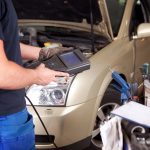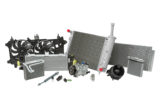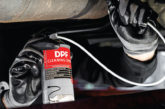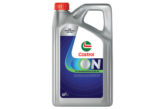Josh Jones, a regular contributor to PMM ’s Troubleshooter section, gives his take on the future of the automotive repair industry and what it means for diagnostics.
As a technician in my early thirties, I am aware that if I am lucky enough to live until retirement age or beyond, I have at least 30 to 35 years of working life left. If you take the last 35 years as a measure of increasing complexity in workshop practice and diagnostic technique, then it can clearly be seen that a totally different world has emerged – and continues to do so. 35 years ago, technicians were getting to grips with the first ventures by VMs into using fuel injection and that was pretty much the most advanced piece of tech fitted to a car at the time. 35 years later, we are now dealing with things like Flexray networking systems and staring down the barrel at the beginning of the end of the internal combustion engine in passenger vehicles.
My biggest personal worry in this trade has always been: what will my skills be worth in 20 years’ time and will that worth put a roof over my head and feed my kids? That’s a rolling 20 years by the way and can you ever answer that question? What are the factors that need to be taken into account? We may end up being heavily influenced by the way people buy and/or own cars and how they plan to finance their maintenance. At the moment, there seems to have been a great shift toward personal leasing platforms which gives people a more workable option for dealing with the costs of ownership. For an independent workshop, this may not always be a great thing, as often the service and repair garages working on these cars are contracted to work on them at a trade rate that would be less than what they would charge a retail customer.
Needless to say, the customer is just looking to get the best deal on their car and its servicing, and you can’t argue with that. I once asked a very wise man where he saw all this going in the future. He told me that when any car comes to the end of a leasing agreement it is sold into the private market and will need to be looked after, following this sale.I am inclined to agree with this. That gives me some comfort but for me personally, it still leaves one thing outstanding. Is leasing a car the best deal for the customer and what does the future hold for this way of ‘owning’ a car?
In this country we make a big fuss about house ownership and how critical to our long term wealth it is but we don’t generally feel the same way about our second biggest asset – at least for some people – the car. If people buy their own cars from new, then at the end of the finance period they have paid for a car which on average after five years might, I would suggest, still retain 50% of its original purchase price as market value. If the vehicle is sold privately, the original owner can spend this money however they wish – it is in their control.
I understand totally that leasing platforms reduce the level of risk for consumers as whatever happens to their vehicle, they know it will not initially affect them financially. However, if the cost of owning these vehicles is more than the amount the average consumer is paying to lease them, then how are leasing companies making money? The answer is that long term, they don’t cost more to own than lease. I believe that a lot of people would happily lean towards their local independent repairer for advice on the subject of vehicle ownership and as business owners and technicians, we are well poised to provide them with the required information, in turn building better, long term working relationships with customers.
Independent garages have to constantly make customers aware of the advantages of their services over that of a dealership. But what are the main differences between them? Effectively, a dealership is an independent garage that has officially affiliated to a brand and the vast majority of them would have started off as small independent outfits. These businesses chose to work toward specialist services and affiliation, as opposed to simply warding off the threat of the dealership having superior technical capability to them. If a well-adapted garage specialising in a particular brand is capable of dealer level service then there is no reason for it not to have the long term goal, if desired, to affiliate itself with that brand as an authorised service centre. I certainly don’t believe there is a shortage of available workload, as lead in times for any good dealership or independent garage in my area currently sit at about two weeks and as a way of gauging demand for our services, I’m pretty pleased about that! But what does all this mean for diagnostics?
I grew up on a dairy farm and got up before school some days to help milk 120 cows. I watched the dynamics of this farm from a kid’s point of view and saw it change over the years. The milking Parlour is now 12 houses and the herd is gone. There is huge worry in the farming community that producing milk is now barely profitable due to changing factors in the way the UK buys milk at wholesale level.

Having watched all this take place first hand, it rang a bell (no pun intended) with me when I started working in an independent garage. Both industries have concerns over the long term viability of providing their service/producing their product due to modernisation but the odd thing is there is still huge demand for the output of both industries. Again, in both cases there are businesses that have fallen by the wayside but there are many that have decided that adaption is necessary in order to survive.
I bought some organic ice cream to feed the guests at my wedding from a farm near me and paid nearly £5 a litre for it. If that had been sold as milk it could have gone for 1/25 of that price. My point is that anyone can moan that their industry is changing but for those who roll with it and change their businesses accordingly, the future is massively bright. Anyone reading this that owned a business 35 years ago: would you have ever imagined back then, that in 35 years’ time you would be plugging a scan tool into the vehicle that has access to every control unit on board and is also connected to the internet, enabling downloads of more data in one day than was used in a moon landing? Probably not, but you’re still here doing it. I believe that independent garages that adapt to market demand by means of being capable to repair up to date vehicles competently, will be here in another 35 years.










